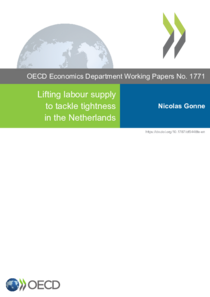Lifting labour supply to tackle tightness in the Netherlands

Organisation for Economic Co-operation and Development, Paris
OECD Publishing - Paris
2023
46 p.
labour market segmentation ; labour supply ; labour market ; migrant worker ; gender ; skill requirement
OECD Economics Department Working Papers
1771
Labour market
https://doi.org/10.1787/df5448fe-en
English
Bibliogr.
"The Dutch labour market is strong but very tight. The unprecedently fast recovery from the pandemic, fast-changing skill demand, low hours worked, and the segmentation of the labour market contribute to labour shortages, weighing on growth potential and jeopardising the green and digital transitions. To tackle shortages, lifting labour supply is a necessary complement to raising productivity, as labour-saving innovation alone is unlikely to significantly reduce overall labour demand. Lowering the effective tax rate on moving from part-time to full-time employment and streamlining income-dependent benefits while improving access to childcare would both increase labour input and reduce gender inequalities in career prospects, incomes, and social protection. Narrowing regulatory gaps between regular and non-standard forms of employment further would alleviate shortages by facilitating transitions between occupations. Better integrating people with a migrant background and easing medium-skill labour migration in specific occupations would help to fill vacancies, especially those related to the lowcarbon transition. Scaling up the individualised training scheme while ensuring quality and providing stronger incentives for co-financing by employers would boost the supply of skills and promote growth in expanding industries. Rewarding teachers in schools where shortages are significant and facilitating mobility between vocational and academic tracks would improve equality in education and better prepare the future workforce."
Digital
The ETUI is co-funded by the European Union. Views and opinions expressed are however those of the author(s) only and do not necessarily reflect those of the European Union or the ETUI.